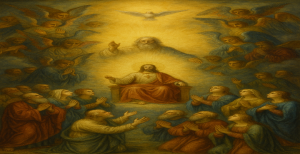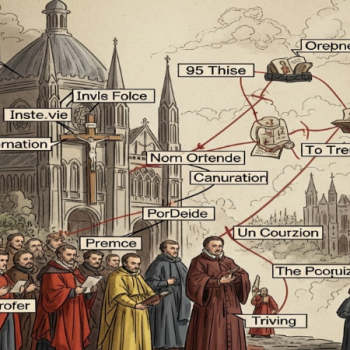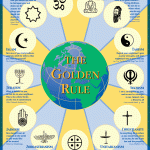
Because of his transcendence, God cannot be seen as he is, unless he himself opens up his mystery to man’s immediate contemplation and gives him the capacity for it. The Church calls this contemplation of God in his heavenly glory “the beatific vision” (Catechism of the Catholic Church, Paragraph 1028).
The belief that God became a human being is foundational to understanding how our salvation was made possible and is a core belief of the Catholic faith. It is also the departure point for many theological questions.
One such question asks whether Jesus possessed the beatific vision. In order to address this question, it is necessary first to examine another complex theological concept, the hypostatic union.
The Hypostatic Union
The term hypostatic union refers to the belief that Jesus has both a divine and human nature. It is, therefore, the union of the human and divine natures in the one divine person of Christ.
The Council of Chalcedon (A.D. 451) declared that the two natures of Christ are joined “in one person and one hypostasis” (Denzinger, Henry, and Roy Joseph Deferrari. The Sources of Catholic Dogma. Createspace Independent Pub, 2013). Hypostasis is a Greek word that denotes a thing’s specific essence or nature.
However, the phrase hypostatic union was not adopted until the fifth general council at Constantinople (A.D. 533). The council utilized the concept of hypostatic union to express the Catholic doctrine about Jesus Christ, which states that in Him are two perfect natures, one divine and one human.
The term nature can be ambiguous. Under the auspices of philosophy and within the context of the hypostatic union, nature refers to the essential qualities or traits that make something what it is. Catholicism believes and asserts that Jesus uniquely possesses both a human and a divine nature.
Understanding this unique union of two natures in one person is essential before we can fully address whether Christ, in His humanity, experienced the beatific vision.
The Beatific Vision
The use of the word vision is somewhat misleading. It does not necessarily mean seeing in a physical sense. Rather, the beatific vision refers to the capacity of the souls of the saints to “clearly behold God, one and triune, as He is” (Denzinger, Henry, and Roy Joseph Deferrari. The Sources of Catholic Dogma. Createspace Independent Pub, 2013). Moreover, it is the intuitive knowledge of God that produces heavenly beatitude.
It is called vision in the mind by analogy with bodily sight, which is the most comprehensive of human sense faculties; it is called beatific because it produces happiness in the will and the whole being.
As defined by the Catholic Church, the souls of the just “see the divine essence by an intuitive vision and face to face, so that the divine essence is known immediately, showing itself plainly, clearly and openly, and not immediately through any creature” (Denzinger, Henry, and Roy Joseph Deferrari. The Sources of Catholic Dogma. Createspace Independent Pub, 2013.). This is an important point.
In our current state, knowledge of God is mediated through creation and, on occasion, through divine revelation. We infer God’s existence through various causes and His nature by attributes attributed to Him, but “For now we see through a glass, darkly.”
This is not the case for the souls of the blessed in Heaven, who have immediate knowledge of God. Immediate knowledge of God means that God is known to the intellect without the need for analogies or even concepts. God becomes known as we know ourselves (1 Corinthians 13:12).
But what about the God-man, Jesus of Nazareth? If Jesus is indeed both human and divine, did He (in His human form) perceive the beatific vision?
Jesus And The Vision Of God
The problem or question surrounding Jesus and the beatific vision can be framed this way. As indicated above, human beings, by virtue of their fallen and finite nature, are incapable of comprehending God as God truly is – God in His essential nature. Jesus possessed (and still does) a human nature. Therefore, it would seem that Jesus did not enjoy the beatific vision while in a human form. However, Jesus also possessed a divine nature while in a human form.
The place to begin is with Scripture. The Bible describes the human Jesus as being “full of grace and truth” (John 1:14) and “filled with wisdom” (Luke 2:40). The language is reminiscent of how Mary is portrayed and is significant.
To be “full of grace” is to be free from the stain of original and personal sin. This would suggest that Jesus’s human nature was not prevented from knowing God’s essence. However, the intrinsic reason why Jesus was free from sin is also the answer to the question posed by this essay.
The two natures that exist in the one person of Christ are not in conflict or kept separate. It is important to point out that His natures remain distinct, with the divine nature retaining its divine attributes and the human nature retaining its human attributes. Nevertheless, it should be admitted that the divine nature of Christ illuminates and informs His human nature. Put another way, the divine grace elevates and perfects Christ’s human nature.
This interplay between His two natures makes it possible for Christ to behold the beatific vision in His human nature. Additionally, because Christ enjoyed the beatific vision in His human nature, He possessed the infused knowledge of the natural truths and of the truths God revealed to mankind. He also knew the necessary particulars of every moment through his acquired knowledge.
Still, it is reasonable to ask why Christ must possess two natures. The answer lies, at least partially, in the necessity of the hypostatic union to effect human salvation. If Jesus is not God, He cannot save us. If Jesus is not human, He could not represent humanity and, therefore, could not have paid the price for sin that divine justice demands.
Conclusion
At first glance, the question of whether Jesus possessed the beatific vision seems to be esoteric and impractical. However, when we understand the significance of the hypostatic union and the beatific vision have on soteriology, the subject becomes significant.













